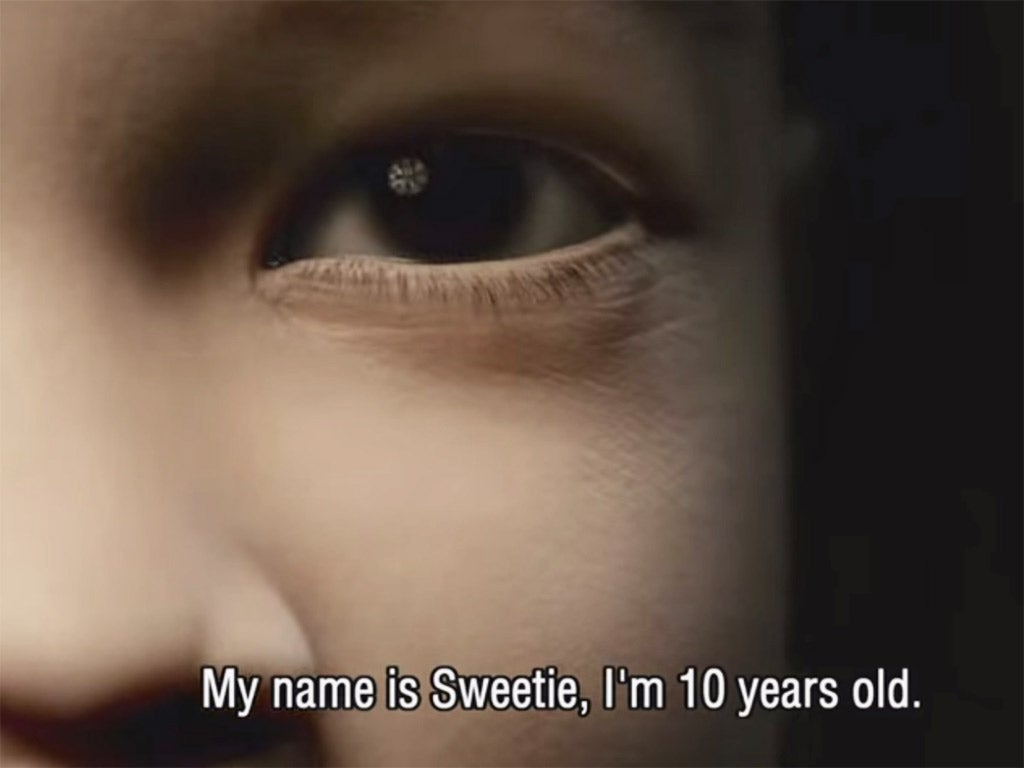Sweetie, the fake 10-year-old girl designed to catch online predators, claims her first scalp
Australian Scott Robert Hansen pleads guilty to three charges

It seemed to be the courageous sting which did what police around the world would not dare to do: the creation of a computer-generated 10-year-old girl to ensnare men who sought out sexual images of children.
But there are serious doubts about whether the evidence gathered from a fake profile set up by a charity in the Netherlands called Terre Des Hommes would be admissible in British courts. Child protection experts have also told the Independent that using entrapment to capture online child sex offenders is ineffective and could actually make the targets more dangerous as well as damage existing investigations.
A team of four researchers from Terre Des Hommes spent 10 weeks of 2013 posing in chat rooms as young girls from the Philippines. They even made computer generated images of a fake profile, nicknamed Sweetie, for webcam chats.
Police forces around the world were sent details of 1,000 men who had contacted Sweetie and were invited to investigate. Many of the men requested that she perform sex acts in front of a webcam for cash.
Today, Sweetie claimed her first scalp. An Australian man called Scott Robert Hansen, who is a registered sex offender, pleaded guilty to three charges in Brisbane District Court. He admitted to sending obscene pictures of himself to Sweetie, as well as having images of child sexual abuse on his computer and failing to comply with a sex offenders order. He was sentenced to two years in prison.
In a week when the head of the National Crime Agency was pilloried for admitting that police in Britain will only ever put away a fraction of the 50,000 possible child sex offenders that cross its path, news of the sting’s first scalp should have been encouraging. But as doubts are raised about the research method's effectiveness in Britain, the Sweetie sting has only raised more questions about the best way to deal with people who view indecent images of children online.

Donald Findlater, director of research and development for the Lucy Faithfull Foundation, a charity which works to prevent child sexual abuse, said: “The risk of online vigilantes or the honey trap idea is that it’s not run by the police, and there’s an enormous capacity to make people more dangerous. If you suggest to people that children are sexually available there’s a risk you make them more sexually dangerous online.”
The NCA was sent details of 110 British men who had been caught in the Sweetie sting, but many would be very difficult to prosecute in British courts because the UK has strong laws against accepting evidence gained by entrapment. The NCA also says a substantial amount of work needs to be done to even identify the 110 men it has been notified about.
Keith Bristow, director general of the NCA, came under fire earlier this week for saying that police could not investigate all 50,000 possible sex offender cases, adding: “Our responsibility is to focus on the greatest risk and tackle those people.”
The Lucy Faithfull Foundation’s Findlater said: “I’m delighted that the NCA have been honest about this, rather than posture. If we know that last year, and the year before, police forces across England and Wales together arrested around 3,500 individuals [for child sexual offences], with all the resources that took to do - and then look at this 50,000 number, are we really looking at making arrests of all these? And where should the money come from? Should we take it from anti-terrorism?”
Findlater added: “Some of these 50,000 people would have been 16-year-olds looking at 15-year-old girls. When we give the label "online paedophile" we’re conjuring up a particular public image of what we’re thinking about, yet some will be young people themselves and exploring their sexuality online.
“Do we really think the law is the only way? I want the police to catch the guy speeding doing 90, I don’t want the police to catch the guy doing 75. The police need to focus their energies on the most dangerous cases.”
Claire Lilley, the NSPCC’s head of child safety online, also believes that entrapment such as that used in the Sweetie case is potentially dangerous. “In the UK there are really rigid guidelines that cover covert operations that the police use and that’s for good reasons”, she said “This kind of action can jeopardise ongoing police investigations. We’d encourage people to leave this sort of activity to the police. It could mean that people who are grooming children get away with it because the evidence-gathering process is interfered with.”
Head of the Sweetie programme, Hans Guyt, told the BBC that the Australian prosecution meant “Law enforcement now know that the information we supplied can be very useful”. He added: “The only way to try and find these people is to patrol the internet.” Mr Guyt did not respond to The Independent’s request for comment.
